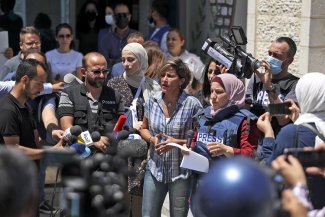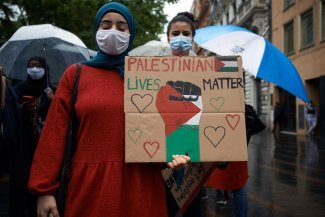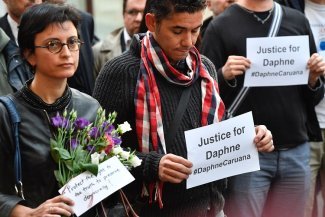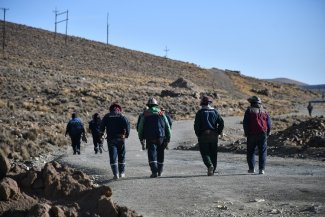
Even for those not familiar with the nature of the Palestinian occupation by Israel and for those who find the situation ‘too complex’ to engage with, the image of Israeli forces kicking at the legs of the pall bearers of a woman’s coffin in Jerusalem in May 2022, visually communicated the dehumanising brutality of Israel’s treatment of Palestinians, which has recently been found to constitute the legal definition of ‘apartheid’ by leading human rights groups and the United Nations. For regular observers of the situation in Palestine, who may fear becoming hardened by the increasing number of shootings and arrests of men, women and children; of settler violence; land confiscation and home demolitions; the collective punishment of villages, refugee camps and towns; the use of torture; undercover police; drones; white phosphorous and aerial bombings; the kicking of the legs of the pallbearers struggling to keep the coffin aloft, struck a new chord of outrage.
The woman whose body was laid to rest in the coffin, Shireen Abu Akleh, was a 51-year-old journalist from Jerusalem. Polite, measured and dedicated, she was known from Morocco to Kuwait and beyond, for her careful and courageous reporting on Palestine for Al Jazeera. On the morning of her death, she was in the West Bank city of Jenin for an assignment. Wearing a clearly marked ‘PRESS’ vest, she was in the company of five other journalists, including her colleagues Ali Samoudi and Shatha Hanaysha when she was shot in the back of her head below her protective helmet. She died instantly.
Separate investigations were conducted by media such as CNN, The New York Times, Bellingcat, The Washington Post, and Al-Haq in collaboration with Forensic Architecture. Using open-source imagery and relating their findings to witness accounts, all concurred that the shots killing Abu Akleh and wounding Samoudi (who was shot in the back) came from the direction of Israeli troops positioned down the street, who had an unobstructed field of vision and would have been able to clearly see the marked press vests. The Israeli government response has been inconsistent and entirely lacking in application or good intentions when it comes to taking steps to question or apprehend the perpetrators of this crime.
Despite being the highest profile Palestinian journalist killed in this way, Abu Akleh’s killing was far from being an anomaly. In recent years, Palestinian journalists, who live under belligerent occupation (and land, sea and air blockade in the case of Gaza) have had their freedom of movement curtailed and have been vulnerable to attacks and arrest. Big tech allows for further infringement upon their digital rights taking down content, shadow banning and blocking social media accounts, as well as surveillance.
In recent years, the attacks on journalists everywhere have become more bloody, brutal and deathly than ever before. The trend is alarming, and the pattern is evident: journalists are being singled out and attacked and killed because of their profession. Although in 2021, fewer journalists and media workers were killed worldwide than the previous year, 45 deaths is still 45 too many. Meanwhile, systematic attacks on Palestinian journalists are escalating – and it’s terrifying.
During the 2018 protests in Gaza (during The March of Return), 39 media workers were injured by live Israeli ammunition. At least 46 journalists were killed by Israel between 2000 and 2021, according to the Palestinian Journalists Syndicate (PJS) and the International Federation of Journalists (IFJ). Outrage led to the PJS, IFJ and renowned barristers Doughty Street Chambers calling on the UN Special Rapporteurs to intervene in 2020. But the attacks continued. In April 2022, the International Centre of Justice for Palestinians (ICJP) joined forces with the PJS, IFJ, Doughty Street Chambers and Bindmans Solicitors to submit a communication to the International Criminal Court (ICC) in the Hague, requesting the Office of the Prosecutor to investigate the shooting of four journalists: two shot in the eye in the West Bank (Muath Amarneh, Nedal Eshtayeh), and two killed in Gaza (Ahmad Abu Hussein and Yaser Murtaja). These shootings were put in the wider context of attacks on Palestinian journalists, such as the deliberate bombing of high-rise buildings that housed Palestinian and international media in Gaza in 2021, which resulted in the deaths of at least two journalists and injuries to over 100. At the press conference on these submissions, IFJ treasurer Jim Boumelha recounted the fear in journalists’ voices before leaving for assignments. The PJS has recorded 479 attacks and crimes against journalists since the beginning of 2022.
The UN Independent Commission of Inquiry in the Occupied Palestinian Territory, including East Jerusalem and Israel, has described Israel’s record for investigating the deaths of Palestinians in Gaza and the West Bank as “dismal”. Today, on the International Day to End Impunity for Crimes Committed Against Journalists, we at the ICJP are calling for all crimes against journalists to be investigated. Impunity for must end and justice must be served. Journalists have to be supported in their vital role of informing audiences on what is happening in the world. We join the IFJ in calling on governments across the world to adopt a UN Convention on the Safety and Independence of Journalists and Other Media Professionals. We also call on them to encourage the ICC to investigate the communications submitted to them with regards to the systematic targeting of journalists in Palestine and globally.











